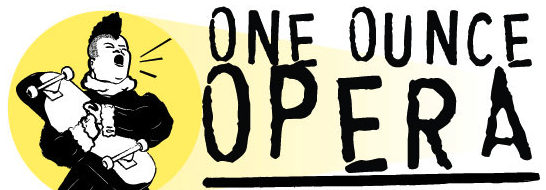 This is the fifth — and final — in our series of composer spotlights previewing the Inaugural Fresh Squeezed Ounce of Opera, April 15 and 16, 2016. Meet Jesse McMilin, composer of the one act opera A Miller’s Tale, based on a story in Chaucer’s Canterbury Tales. OOO Member Julie Silva conducted this interview. Julie will portray “Alison” in McMilin’s new work, which is getting it’s premiere at FSOO!
This is the fifth — and final — in our series of composer spotlights previewing the Inaugural Fresh Squeezed Ounce of Opera, April 15 and 16, 2016. Meet Jesse McMilin, composer of the one act opera A Miller’s Tale, based on a story in Chaucer’s Canterbury Tales. OOO Member Julie Silva conducted this interview. Julie will portray “Alison” in McMilin’s new work, which is getting it’s premiere at FSOO!
1) So, how did you choose The Miller’s Tale in particular from Chaucer’s Canterbury Tales for the inspiration for your opera? What do you like about these characters?
When I heard about OOO’s call for short opera, I racked my brain for story material that was concise, humorous, and timeless. The Canterbury Tales immediately struck me as the perfect place to start my search, and The Miller’s Tale, with its wild antics and fast pace, stood out especially. The characters are nothing if not entertaining. The clever Alison and selfish Nicholas will sacrifice John’s happiness to satisfy their desires, and seem to even enjoy manipulating this helpless old buffoon.
While the plot of the opera differs substantially from that of the source material, the dynamic of these three characters remains much the same. Absalon, on the other hand, ends up playing a different role entirely: while in the original he’s just another idiot caught up in Alison’s and Nicholas’s self-interested games, he’s portrayed as a villain in my opera. I felt it would make more sense to introduce him in an added scene for a stage adaption because, in the original, he was introduced toward the end and his motives were described through narration, which would make very little sense in this context. When I introduced him in this fabricated scene, I found myself highlighting his more visceral, disgusting qualities, and by the middle of the scene, I had decided to roll with it. He had become the villain in a villain-less story; a fool, yes, but a dangerous one.
The next greatest character change I made happened in the finer details of Alison’s character. I wanted to emphasize her cleverness, her disregard for loyalty and authority, and her fearlessness. I also wanted to add just a smidgen of empathy (which, in the original, I am nearly convinced she totally lacks). This is used to bring about a sense of moral closure as she finally learns to feel the pain of John’s simple but innocent confusion during the conclusion of the opera. The same sort of closure isn’t used in the original story, that Chaucer might reveal the character of the miller who tells it; the story ends more abruptly, but the effectiveness of this technique again relies on narration, as well as an outside context for the tale’s delivery.
2. How did Chaucer’s Miller’s Tale influence your composition? How would you describe your compositional style in this opera?

The compositional style of The Miller’s Tale varies depending on the character singing. I have motifs that are stylized in various ways depending on whose dialogue they highlight, and while there are exceptions, I have distinct “feels” for each of the characters. Nicholas’s is lilting and carefree while warped by dissonance, indicating his remorselessly manipulative nature; Alison’s heavily relies on the diminished and lydian-mixolydian scales (an eight note scale alternating half-whole-half-whole and a major scale with the raised fourth of lydian plus the lowered seventh of mixolydian, respectively) to indicate her unconventionally whimsical nature, which, paired with her several contortions of John’s main theme, and several adaptions of her twelve-bar-blues “plotting” theme by Nicholas, I hope will help emphasize her adaptability and pervasiveness; meanwhile, John’s style is mainly diatonic and textually warm compared to the surrounding writing, while Absalon’s is heavy-handed, brooding, and repetitive.
3. When and why did you start composing classical music? Who are your key influences? What’s your favorite opera?
I’m not sure when to mark precisely when I started writing “classical” music. Was it when I wrote my first song that was more than a fleeting improvisation to be forgotten later? If so, the answer would be fourth grade. If the first original song to be written in notation and performed by an ensemble marks this point, then eighth grade. But really, I’ve always loved classical music and been enthusiastic about composition, and have made a regular pastime of sitting for hours at a time at the piano just playing whatever comes to mind–a habit I’ve kept up since I first started receiving a music education at five years old.
I listened to nothing but classical for nearly the first two thirds of my life, loving Bach initially in my early childhood for its mesmerizing, delicate passages before developing a strong interest in the romantics in my later childhood and early teens when I lived consumed by a universe inspired by the countless fantasy novels I was enthralled with at the time; the programmatic stories of Grieg, Saint-Seans, and Rachmaninoff provided the perfect background to my imaginary world.
In my later teens, I discovered the impressionists, finding Debussy’s and Ravel’s thoughtful color palettes enlighteningly fresh. At the same time, I followed a separate strain that bought me to Gershwin, who, despite my previous experience with jazz, really helped me develop a liking for the jazz of that time. He also composed my favorite opera, Porgy and Bess, combining opera tradition with his musical theater experience. But I digress: the impressionists, at this time, seemed more mature to my developing ear than the romantics, who at this time sounded stagnant to me. Of course, my love of the romantic era never really faded, just receded for a time to make way for what I thought would define my musical style from there on out. Of course, I was mistaken; within the past two years, I’ve come to adore the expressionists, especially Bartok and early Stravinsky. I love how raw and visceral their harmonies are, how jaggedly their syncopated rhythms pull the listener to and fro. These two remain the most prominent classical influences on my work, Bartok being a major influence on The Miller’s Tale specifically.
4. Where do you think the future of opera is headed?
I’m no musicologist, nor has the focus of my writing been opera (this is the first I’ve ever written), and I can’t say for certain where I think opera is headed. It’s no mystery that the popularity of opera in the traditional sense has suffered a decline, but its legacy manifests itself in other ways. There is, no doubt, a fine and often twisting line between opera and musical theater, the latter of which is by no means decreasing in popularity. However, I don’t believe that opera as a distinct art form is dead to the public as long as modern opera continues to persevere through organizations like OOO.
I took special note that one of the most prominent aspects of advertising for Fresh Squeezed Ounce consists of two words: in English. This essentially says, “The text is meant to be understood,” for the average resident of Austin. I think the emphasis placed here marks one of the ways in which opera must change if it is to survive; while an opera enthusiast can enjoy the sheer spectacle of an opera whose language they don’t understand, there is a reason that musical theater has thrived, and that, I believe, is an emphasis on text. When the communicability of the text matches the ubiquity and depth of the music (distinguished from that of musical theater, which is divided into distinct, standalone numbers), opera will, perhaps, not seem so daunting and antiquated to any given person. Of course, this is a very hastily drawn hypothesis from an inexperienced composer, but I hope it can provide some insight.
Jesse McMilin is from California. To find out more about Jesse, come meet him in person on Saturday, April 16th!

